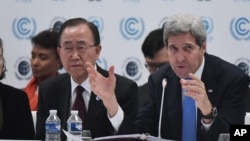U.S. Secretary of State John Kerry has taken the U.S. administration’s criticism of climate change doubters to a new level, labeling those who reject mainstream climate science as “insane.”
The top U.S. diplomat made the remark while speaking at a meeting of the U.N. Foundation on the world’s oceans in Paris, where U.N. climate talks are in their second and final week.
Kerry told the audience the refusal by doubters to recognize the threat of rising sea levels is “insulting to everything we learned in high school about science.”
"We have people who still deny this — members of the flat Earth society who seem to believe that the ocean rise won't be a problem because the water will just spill over the edge," Kerry said.
The comments drew laughter from the audience, which included the founder of the U.N. Foundation, American media magnate Ted Turner.
Kerry’s strong language reflected frustration by the U.S. administration as it finds itself locked in a dispute with the Republican-led U.S. Congress on funding of President Barack Obama’s promise to contribute billions of dollars to the Green Climate Fund.
The fund’s aim is to help developing nations pay for green energy and other climate programs.
The administration is asking the Congress to approve half a billion dollars for the program, but chances of that are uncertain, U.S. officials in Paris indicated this week. "I hope we can get as close to it as we can, but we don’t know yet," said Todd Stern, the U.S. Special Envoy for Climate Change.
The issue of whether climatic changes are caused by human actions remains a controversial subject in the United States. Some Republican politicians and members of the public question assertions by mainstream scientists that global warming is a serious issue and they express concerns that green energy mandates harm U.S. industry and threaten American jobs.
Approval of funding could end up being crucial to the success of the U.N. climate talks ending on Friday.
Prospects for a landmark climate deal have been buoyed by the fact that developing nations have, unlike before, promised to reduce carbon emissions. Those pledges, however, hinge on whether richer nations will finance and provide the technology to carry out projects the poorer countries could otherwise not afford.




